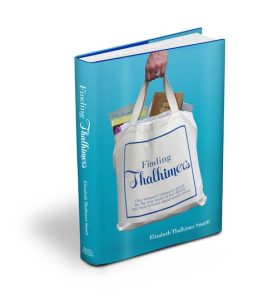Elizabeth Thalhimer Smartt (’98) has written “Finding Thalhimers” the story of her family and their business, a well-known retail institution for 150 years.
Along with her mentor, Associate Professor of Communication Mary Dalton (’83), she’ll talk about the book and give an insider’s perspective into the history of this ambitious Richmond family during “Preserving Your Story,” a panel discussion sponsored by the Family Business Center from 3-4:30 p.m. Oct. 14 at Reynolda House Museum of American Art. There is no charge to attend the event, which will be followed by a wine and cheese reception, but registration is required.
Elizabeth, what prompted you to write this book?
Thalhimers, my family’s store, closed in 1992 after 150 years of business. I began to feel responsible for making sure our story was preserved, as it’s much more than just a family genealogy or a business history. It’s the saga of a German Jewish retail family and a much-loved department store that witnessed Southern history as it unfolded. I dedicated the book to my dad, William B. Thalhimer III, who really was my inspiration for the project from the beginning. You’ll have to read the book to find out how he secretly suckered me into it!
You describe the process as a genealogical treasure hunt. What have you learned about your family?
I learned that finding your roots is an incredible experience, covering vast amounts of territory. I learned things that surprised me, impressed me, frightened me and inspired me to be a better person. I still find it incredible that my family was able to continuously run a store through wars, financial panics including the Great Depression, anti-Semitism and social upheaval. Each generation seemed smarter and more committed than the last, which seems pretty amazing! There wasn’t a weak link in the leadership chain. I wanted to be the first female president of the store, although that was not to be. However, I do feel like I was able to contribute something significant by writing this book to honor and remember my ancestors.
Thalhimers was described by many as “the fancy” department store! Was it the Macy’s or Nordstrom of its day?
I’m not sure you could compare it to anything around today. Richmond’s downtown Thalhimers store sold not only clothes and shoes, but had three restaurants (one of them a hot-dog joint with jukeboxes), a bakery, gourmet foods shop, beauty salon, fur salon, pharmacy, travel agency, optometrist’s shop, and a large auditorium for fashion shows, art exhibitions and Santa Claus at Christmas. Departments included everything from toys to cigars to books to collectible stamps … It was almost like a mall-within-a-store!
 You’ll take part in a discussion about family business when you return to Wake Forest on Oct 14. Based on your family’s story, what are your tips for success?
You’ll take part in a discussion about family business when you return to Wake Forest on Oct 14. Based on your family’s story, what are your tips for success?
After studying the 150-year history of my family’s store, it seems that longevity and success are directly associated with three things: competent leadership, agility to change according to the times, and true commitment to exceeding the expectations of your customers. Even though it sounds cliche, every generation of the store’s leadership maintained commitment to the values: HONESTY, INTEGRITY, QUALITY and SERVICE. These weren’t just buzz words; they were a way of life at Thalhimers.
Your book has a poignant story of a Thalhimers employee who came to the rescue of one hysterical bride-to-be. Are there other fond memories or funny stories?
There are humorous moments in the book, especially in the autobiographical parts written in my own voice, but it’s mostly an epic story of a Southern Jewish retail family told against the backdrop of American history. It includes everything from the Civil War to the industrialization of fashion to the sit-ins of the Civil Rights Movement and my grandfather meeting with President Kennedy to share his experiences of non-violent integration.
But to answer your question: one funny Thalhimers story that comes to mind is one my dad tells in the chapter where I’m interviewing him at a deli. He told me, “The worst purchase I ever made as a handbag buyer was the Adolfo bag, the ‘A’ bag as they called it. It was a status bag selling like crazy in New York. I bought four hundred of them. Right when we first displayed them, the first little old lady hobbled up to me and said, ‘don’t you have anything with an R on it? My name starts with an R.’ My mother felt so sorry for me that she bought four of them.” I can picture little old Richmonders not knowing what was fashionable in New York, and I can imagine my grandmother buying those bags just to make Dad feel better! I wish I had one today.
Were there particular people or classes at Wake Forest that shaped your career path?
Yes — Dr. Mary Dalton (’83), my film teacher and Honors project advisor. She believed in me, helped me gain much-needed self-esteem and taught me the importance of storytelling. I appreciated that she built relationships with myself and many of her students outside of the classroom, and her office door was always open.


